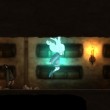Ace Combat Infinity Review
I am tired of being a mercenary. Tired of the coldness we like to imagine they espouse: the dispassionate remove from warfare, the apathy toward allegiance and ideology. Doubtless it's those very qualities that make mercenarism so appealing to the big wigs of video game publishing. The mercenary neatly lampshades the globetrotting and casual mass murder that serve as cornerstones of all the best-selling war games, and he is compensated in a currency gamers accept: the means for newer, more efficient tools of a violent trade. But those easy associations belie a vital loss, because when a series goes mercenary, it sacrifices its heart.
It's hard to look at an entry like Ace Combat Infinity and not see the ways it's diminished by that cynicism. You play as a pilot, of course, engaged in battle against a frightfully well-armed terrorist organization operating out of Central Asia. But you're also a mercenary, so any emotions that premise might elicit get a stiff-arm before they can drag the action down. Why question warfare, when there are kill count competitions to chuckle over on the comms? Why dwell on consequence, when there are battles to be had over skylines from Dubai to Tokyo? Once upon a time, Ace Combat drew its own borders, around names like Ustio and Strangereal. It has since found it more efficient, perhaps, to outsource that effort, and lean on the mental connections we make on our own when we hear mention of foreign countries or words like "terrorist."
But lazy expectations should be challenged, as Infinity's own antecedents once showed. Flight simulation is a niche genre, even when it's given an arcade slant that eschews realistic limitations--as Ace Combat traditionally does--on a plane's maneuverability and payload. We expect such genre games to serve genre fare and little more. A racing game should render unto us prettier cars; a sports game could pursue nothing more noble than a reasonable facsimile of its chosen sport. But Ace Combat once chased its Top Gun guitars with Agustin Barrios Mangore. It interlaced vignettes about the personal lives of rival squadrons in among its screeching dogfights.
Those old games were idealistic and enthusiastic (occasionally embarrassingly so), full of operatic flourishes and moments of pathos that few video games can claim--let alone ones about planes. These were games that knew that when engagements take place over the span of miles, between pilots who never see each other's face, it's the little personal touches that keep the whole affair from feeling like a training exercise. The melancholy cutscenes. The frantic radio chatter. The call signs and emblems and the way enemies sauntered onto the field of battle like WWE wrestlers...that was what made Ace Combat human.
Once upon a time, Ace Combat drew its own borders, around names like Ustio and Strangereal.
You can still find vestiges of those features in Ace Combat Infinity, but they've been shuffled up in what's essentially a remix of the series' greatest hits. Asteroids shower Earth, decimating the population. Monolithic flying fortresses take to the skies over Tokyo. The vaunted Stonehenge cannonade from Ace Combat 4 now fires over canyons in Turkey. This all takes place over the course of five brief missions, with three more planned but nevertheless absent. The first two tastes are free--the rest must be unlocked either through weeks of workmanlike commitment, or a $20 instant access payment that feels wildly out of proportion. I find it hard to confront the commodification of those old memories. Seeing how sausage is valuated is only slightly more fun than seeing how it's made, as it turns out.
If we're to adopt the mercenary's Spartan sense of appraisal, I'd put the real value on Ace Combat Infinity's cooperative multiplayer. Sorties there are paid for with a per diem of "fuel," or an alternative that's depletable and restocked with cold hard cash. But a generous stream of fuel-giving challenges, gifts, and randomized bonuses ensures a thrifty player can take to battle with little in the way of personal commitment.
Therein, it's a four-on-four scramble to see which side can bag the most targets, while still maintaining enough semblance of alliance to score a strong combined rating. It's a unique system, and the light competition provides an impetus to perform without ever becoming overbearing. The feeling of being chased is conspicuous in its absence, though. In, say, Strike Vector, there's a give and take--a constant, whirling fear, where a sudden burst of gunfire sends you into the most convincing approximation of Brownian motion you can conjure up on the spot. Infinity's mostly inert enemies, by comparison, can feel like shooting gallery fodder.









The classic refinement of Ace Combat's gameplay can still shine through. And when your squadron is thrust into a pop-up battle against one of the game's white whale superweapons, it blazes. You get flickering glimpses of the underlying attraction, that passionate artistry that once allowed the series to liken the dogfight to flamenco, and not seem crazy for doing so. It's an impression that can still intermittently catch me when I watch Infinity's abstracted replays, and see my predatory arrow tracing contrails around bogeys, tying bows over enemy ground positions until the besieged markers disappear.
But that damned cynicism, again. It's pervasive. Maybe that's the consequence of life lived as a virtual mercenary: a joylessness that poisons the nostalgia well. The soaring bird that has long served as the metaphor for the Ace Combat pilot becomes a vulture fighting over highway carrion, looping away incautiously when the odd car passes a little too close, before returning again for a final few scraps of flesh.









